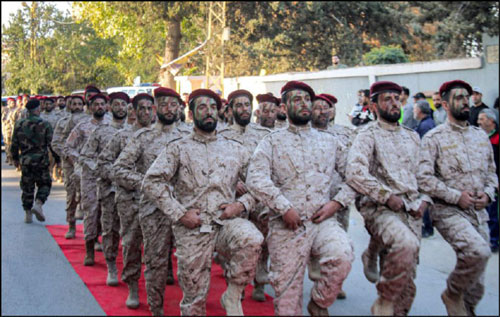Australia on Wednesday listed all of Hezbollah as a “terrorist organisation”, extending a ban on armed factions to the entire movement, which wields consid-erable power over Lebanon.
Home Affairs Min is-ter Karen Andrews said that the Tehran-backed Shiite group “continues to threaten terrorist attacks and provide support to terrorist organisations” and poses a “real” and “credible” threat to Australia.
Hezbollah is part po-litical party and part militia — the only group in Lebanon to have refused to disarm since the civil war ended in 1990.
The movement, which plays a pivotal role in Lebanese politics, has been accused of fuel-ling Syria’s civil war by sending thousands of fighters across the border to prop up President Ba-shar al-Assad’s regime.
In 2006, it fought a short yet devastating war against Israel. Critics have accused the movement of killing former prime minister Rafik Hariri in 2005, and more recently of blocking investigations into the cataclysmic 2020 Beirut port ex-plosion.
Some countries have sought to distinguish between Hezbollah’s political and militant factions, fearing a blanket ban could further destabilise Lebanon and hamper contacts with au-thorities.
Australia had such a policy since 2003, when it banned Hezbollah’s so-called Ex-ternal Security Organisation — a part of the movement’s military wing that is chiefly focused on shadowy overseas operations.
From now, member-ship of the entire organisation or providing funding for it will now be proscribed in Australia, which has a large Lebanese community.
Israeli Prime Minister Naftali Bennett thanked his “friend” and Australian counter-part Scott Morrison for the move.
“Hezbollah is an Ira-nian-backed terror organization in Lebanon responsible for count-less attacks in Israel & around the world,” he tweeted.
No reason was given for the timing of Canberra’s deci-sion, which comes as Lebanon reels from spiralling political and economic crises.
Nearly 80 percent of the population is estimated to be living below the poverty line.
Elections are expected in March 2022 and there is grow-ing public anger about nepotism and corruption among Lebanon’s ruling class.
The move may play well domestically for Australia’s conservative government, ahead of its own elections expected next year.
Before 2018 polls, Morrison made the surprise move of recognising west Jerusalem as Israel’s capital, helping secure votes in a battleground Sydney seat with a sizable Jewish com-munity.
Matthew Levitt, a former US counter-terrorism fi-nancing official now with the Washington Institue for Near East policy, told AFP the move was “long overdue.”
In June, he testified to the Australian parliament that the previous designation was “insuf-ficent” adding that “Hezbollah is structured and operates as a sin-gular organisation.—Agencies










